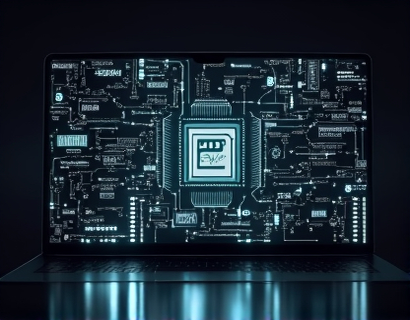Mastering Anonymous Operations: Cutting-Edge Pseudonym Software for Blockchain and AI Privacy Compliance
In the rapidly evolving landscape of technology, the need for robust digital privacy solutions has become paramount, especially within the realms of blockchain and artificial intelligence. As these technologies continue to transform industries, ensuring compliance with regulatory standards while maintaining user anonymity has emerged as a critical challenge. This article delves into the advanced software solutions designed to create and manage secure pseudonyms, enabling users to conduct anonymous and secure digital transactions and interactions. These cutting-edge tools are meticulously crafted to navigate the complexities of privacy compliance, offering seamless integration and enhanced security for tech-savvy individuals in the blockchain and AI space.
The concept of pseudonymity in digital operations involves the use of a temporary or alias identity, allowing users to perform transactions and interactions without revealing their true identity. This approach is particularly vital in blockchain and AI environments, where transparency and traceability can sometimes conflict with the need for privacy. By employing sophisticated pseudonym software, users can effectively mask their identities while still adhering to regulatory requirements, thus striking a balance between anonymity and compliance.
One of the primary advantages of using advanced pseudonym software is the ability to meet stringent regulatory standards. Governments and regulatory bodies worldwide are increasingly focusing on data protection and privacy, introducing laws such as the General Data Protection Regulation (GDPR) in the European Union and the California Consumer Privacy Act (CCPA) in the United States. These regulations mandate that organizations handle personal data responsibly and provide users with control over their information. Pseudonym software helps organizations comply with these regulations by ensuring that user identities are protected and that data is processed in a manner that respects user privacy.
In the context of blockchain, pseudonymity is particularly important due to the inherent transparency of the technology. Blockchain's decentralized and immutable nature makes it challenging to maintain privacy, as all transactions are recorded on a public ledger. Pseudonym software addresses this issue by creating layers of anonymity, allowing users to engage in transactions without directly linking their real-world identities to their blockchain activities. This is achieved through the use of unique, non-reversible identifiers that change periodically, making it difficult for external observers to trace transactions back to the original user.
For AI operations, the need for privacy and pseudonymity is equally significant. AI systems often rely on vast amounts of data, much of which contains sensitive information. By using pseudonymized data, AI developers can train their models without compromising individual privacy. This not only helps in meeting regulatory requirements but also builds trust among users who are increasingly concerned about how their data is used. Pseudonym software ensures that the data fed into AI systems is anonymized, reducing the risk of data breaches and unauthorized access.
To effectively manage pseudonyms, advanced software solutions offer a range of features designed to enhance security and simplify the process. One key feature is the generation of cryptographically secure pseudonyms that are virtually impossible to reverse-engineer. These pseudonyms are created using strong encryption algorithms, ensuring that even if an attacker gains access to the pseudonym, they cannot deduce the user's real identity.
Another critical aspect is the management of pseudonym lifecycles. Pseudonym software includes tools for creating, rotating, and revoking pseudonyms as needed. This dynamic management ensures that users can maintain long-term anonymity while also complying with regulations that may require periodic identity verification. For instance, a user can generate a new pseudonym after a certain period or when a specific threshold of transactions is reached, thereby minimizing the risk of identity linkage over time.
Seamless integration with existing blockchain and AI platforms is another hallmark of advanced pseudonym software. These solutions are designed to work effortlessly with popular blockchain networks such as Ethereum, Binance Smart Chain, and Polkadot, as well as various AI frameworks and platforms. This compatibility ensures that users can incorporate pseudonym functionality into their existing workflows without significant disruptions or additional complexity. The software often provides APIs and SDKs that facilitate easy integration, allowing developers to focus on building their applications while the pseudonym solution handles the underlying privacy concerns.
Enhanced security is a cornerstone of pseudonym software. Beyond generating secure pseudonyms, these solutions implement robust security measures to protect user data and transactions. This includes multi-factor authentication, secure key management, and regular security audits to identify and mitigate potential vulnerabilities. By adopting a security-first approach, users can trust that their pseudonyms and associated data are safeguarded against sophisticated cyber threats.
The user experience is also a critical factor in the success of pseudonym software. Advanced solutions are designed to be user-friendly, with intuitive interfaces that simplify the process of generating and managing pseudonyms. Users can easily create new pseudonyms, view transaction history, and manage their privacy settings all within a single, cohesive platform. This ease of use encourages broader adoption, making advanced privacy features accessible to a wider audience beyond technical experts.
Moreover, these software solutions often come with comprehensive documentation and support resources. Detailed guides, tutorials, and community forums provide users with the necessary tools to fully leverage the software's capabilities. This support system ensures that users can quickly resolve any issues and maximize the benefits of the pseudonym solution, fostering a community of privacy-conscious tech users who can share best practices and insights.
In addition to individual user benefits, pseudonym software plays a crucial role in promoting a culture of privacy and security within the broader tech industry. By demonstrating the feasibility and importance of anonymous operations, these solutions encourage other developers and organizations to prioritize user privacy in their products and services. This shift towards privacy-by-design not only enhances user trust but also drives innovation in the development of more secure and privacy-focused technologies.
The future of pseudonym software in blockchain and AI is promising, with ongoing advancements in cryptography, machine learning, and decentralized systems. As these technologies continue to mature, we can expect even more sophisticated tools that offer greater levels of anonymity and security. The integration of zero-knowledge proofs, homomorphic encryption, and other cutting-edge cryptographic techniques will further enhance the capabilities of pseudonym software, making it an indispensable component of digital privacy strategies.
In conclusion, mastering anonymous operations through advanced pseudonym software is essential for tech users in the blockchain and AI space. These solutions provide a powerful means to navigate the complex landscape of privacy compliance, ensuring that users can engage in digital transactions and interactions with confidence. By leveraging these tools, individuals and organizations can protect their privacy, meet regulatory requirements, and contribute to a more secure and trustworthy digital ecosystem.










































